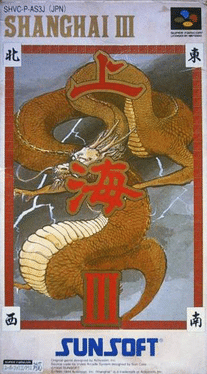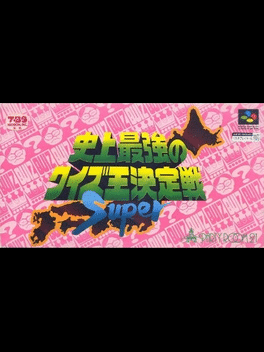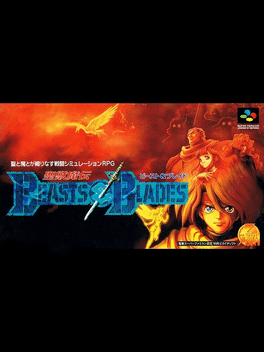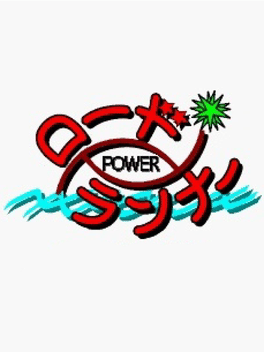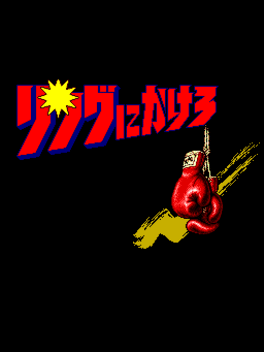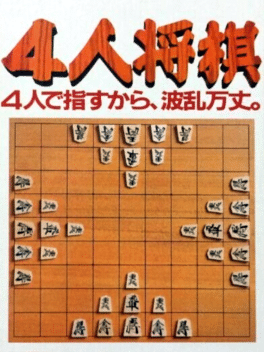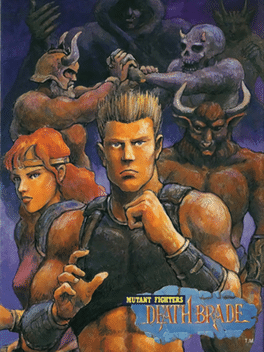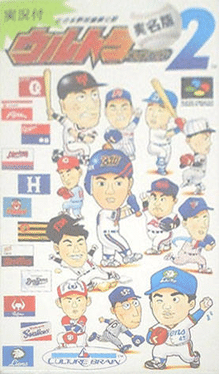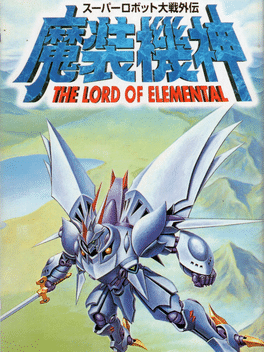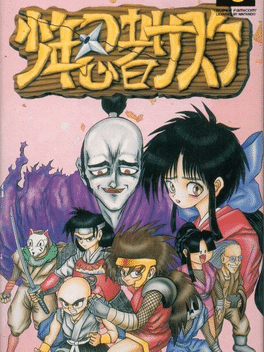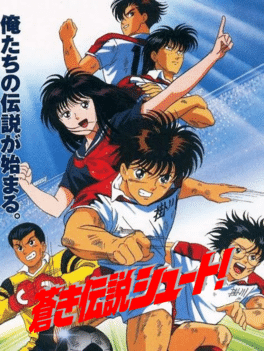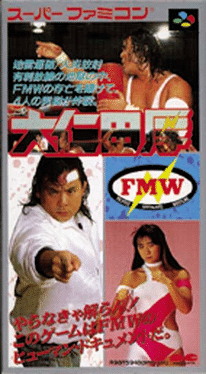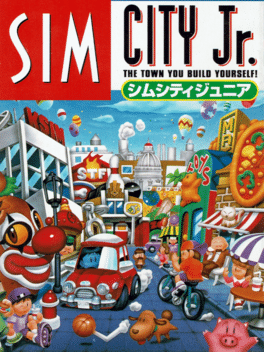Most Popular Super Famicom Games - Page 27
-
Shin Ikkaku Senkin
1995
Shin Ikkaku Senkin
1995
Shin Ikkaku Senkin is a Miscellaneous game, developed by Jorudan and published by Vap, which was released in Japan in 1995. -
Shin SD Sengoku-den: Daishogun Retsuden
1995
Shin SD Sengoku-den: Daishogun Retsuden is a Strategy game, developed and published by Bec, which was released in Japan in 1995. -
Shanghai III
1994
Shanghai III
1994
"Shanghai III" is a puzzle game released by SUNSOFT in 1993. This is the 3rd title of the standard puzzle game series that has gained a lot of popularity by adding new functions such as playing with an opponent. -
Shijou Saikyou no Quiz-ou Ketteisen Super
1992
Shijou Saikyou no Quiz-ou Ketteisen Super is a Miscellaneous game, developed by ISCO and published by Yonezawa PR21, which was released in Japan in 1992. -
Seijuu Maden Beasts & Blades
1995
Seijuu Maden Beasts & Blades is a Strategy game, published by Bullet Proof Software, which was released in Japan in 1995. -
Power Lode Runner
1999
Power Lode Runner
1999
Power Lode Runner is a Super Famicom video game published by Nintendo on the first day of 1999. The game is an updated version of Lode Runner. In the game you'll control Muguru-kun whose primary goal is to collect gold in order to progress through the game. Monkeys will act as the game's villains. The game was released as a Nintendo Power RAM cartridge. -
Ring ni Kakero
1998
Ring ni Kakero
1998
Being the only game based on the Japanese manga of the same title, it covers from "The Champion Carnival" to "The World Championship" in the original. There are 20 boxers and two hidden characters. There were only six voices for all the 22 boxers, voice actors in this game include Daisuke Sakaguchi, Tetsu Inada, Hiroshi Kamiya, Shinichi Yamada, Ito Asako, and Atsushi Kisaichi. Ring ni Kakero is a simulation of amateur boxing rather than professional boxing. Like in real boxing, there is a timer for each round. The game uses a manga outlook to the boxing scene as two fighters appear to fight using various cutscenes for action shots. Each boxer has a special move and an energy meter in addition to a stamina meter. -
4-nin Shogi
1995
4-nin Shogi
1995
4-nin Shogi is a four-person variant of shogi (Japanese chess). It may be played with a dedicated yonin shogi set or with two sets of standard shogi pieces, and is played on a standard sized shogi board. The objective of the game is to capture your opponents’ kings as an individual or with the option of teaming up with one or two fellow players. Fast matches are common. -
Zoku: The Legend of Bishin
1993
Neo Tokyo. After the new Great Depression of 2010, Mount Fuji erupts in a catastrophic manner in the year 2020. While Tokyo survives and the people managed to repair the areas destroyed by the volcano, it become infested with motorcycle gangs. An all-female gang known as the Bishin dominates with the help of their leader, Ryoko. Koji, a 20-year-old former professional boxer, and Lisa, a 16-year-old who used to be a high-ranking Bishin member but left, are attacked and one of them is kidnapped while the other sets out to take down the gang. -
Derby Stallion 98
1998
Derby Stallion 98
1998
The Derby Stallion (ダービースタリオン?) - also known in Japan by the portmanteau abbreviation DerbyStal (ダビスタ?) - video games are a series of genre-merging horse-racing and business simulation games originally created by ASCII Entertainment, and released by Nintendo. The series comprises 21 games, spans more than 10 console platforms, and is the best-selling horse racing series of all time with total sales topping more than 4 million in Japan.[1] -
Death Brade
1993
Death Brade
1993
Fight! Win the tournament and take the throne. The kingdom will be yours. Win or die, there is no escaping the deathmatch! Fight on fearless warriors! -
Ultra Baseball Jitsumei-ban 2
1994
Ultra Baseball Jitsumei-ban 2 is the fifth game in the Ultra Baseball (Baseball Simulator in the USA) series. It was released in 1994 for the Super Nintendo by Culture Brain in Japan only. These Baseball titles included some form of "Super League" where pitchers and batters would have special abilities. Baseball Simulator 1.000 (1989, NES), also known as Choujin Ultra Baseball Super Baseball Simulator 1.000 (1991, Super NES), also known as Super Ultra Baseball Ultra Baseball Jitsumei Ban (1992, SNES) NPB licensed. Super Ultra Baseball 2 (1994, SNES) Ultra Baseball Jitsumei Ban 2 (1994, SNES) NPB licensed. Ultra Baseball Jitsumei Ban 3 (1995, SNES) NPB licensed. -
Shounen Ninja Sasuke
1994
Shounen Ninja Sasuke
1994
The young ninja Sasuke and his monk friend Chin-nan embark on a quest to rescue a daughter of a local lord by fighting his way through hordes of masked bandits led by a mysterious warlord. -
Aoki Densetsu Shoot!
1995
Aoki Densetsu Shoot!
1995
Aoki Densetsu Shoot! is a Japanese anime produced by Toei Animation between November 9, 1990 and December 22, 1991 on the Fuji TV television network; there were fifty-eight episodes. The game has an exhibition mode, an anime-style story mode, and a variety of options, which is entirely in Japanese, so literacy in this language is strongly recommended for quality gameplay. Once the game begins, the action progresses in a side view, similar to an arcade soccer game. -
Onita Atsushi FMW
1993
Onita Atsushi FMW
1993
Player have to fight their way through a fictionalised version of the Frontier Martial-Arts Wrestling organization; the wrestling promotion Onita owned, booked and was the star of throughout the nineties, portrayed in this game to be more of a tournament of the Street Fighter variety than a realistic wrestling company. According to the official slogan of the game, it was considered to incorporate an entire batch of innovative ideas. The instruction manual for the game talked about the virtual pursuit of achieving the total potential of each wrestler. -
Tenryu Genichiro no Pro Wrestling Revolution
1994
Based on pro wrestling legend Tenryu Genichiro and his own wrestling federation WAR, Wrestle and Romance. This game features a 3-way split screen to properly display the action in the ring and outside. -
SimCity Jr.
1996
SimCity Jr.
1996
SimTown is a 1995 video game published by Maxis, much like the best selling SimCity but on a smaller scale. SimTown allows the player to construct a town consisting of streets, houses, businesses and parks and then control the people in it. SimTown was one of the many 'Sim' spin-offs at the time, and was targeted more towards children. The Super Famicom/Super Nintendo Entertainment System version of SimTown is called SimCity Jr. (シムシティJr.). It was published by Imagineer. -
Granhistoria: Genshi Sekaiki
1995
Granhistoria: Genshi Sekaiki is a Super Famicom role-playing video game that was released exclusively for Japan in 1995. This video game is about alternate universes and time travel. Toru is about to marry his lover Lu when he is attacked by thieves and killed. After being transported a few hours before his death and resurrected, he must bring down the thieves and change history. Changing the history of the kingdom is very important and anachronisms like train stations are a part of this strange new universe that the player is cast into.


